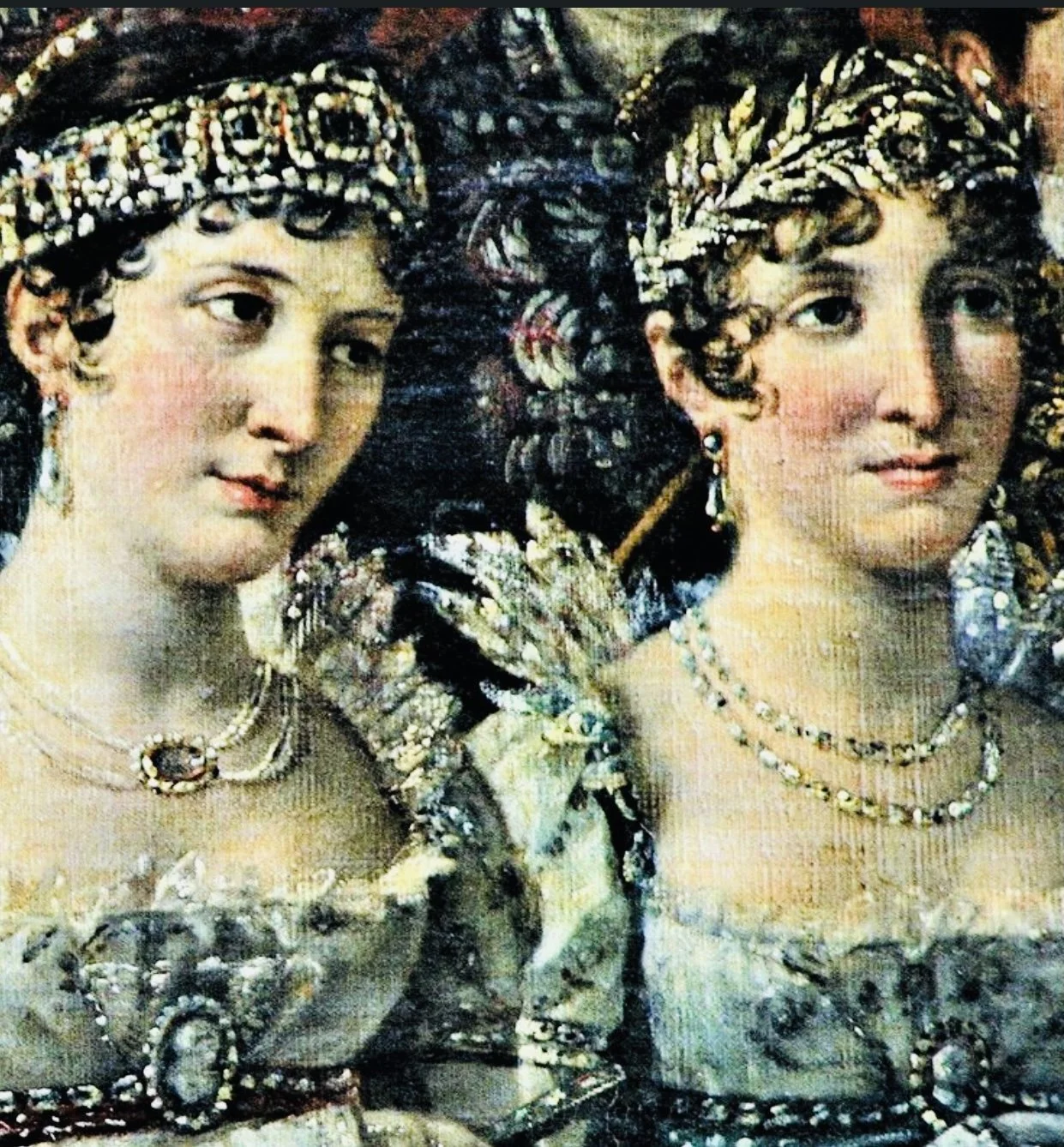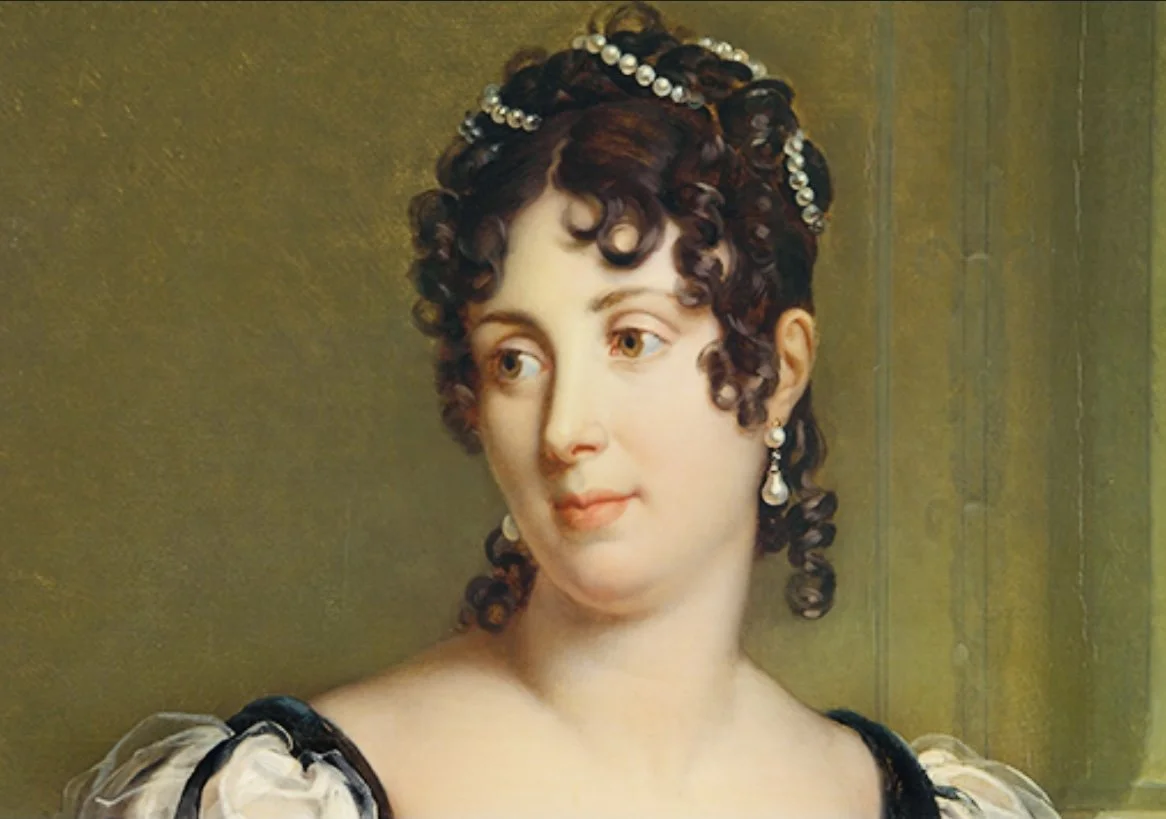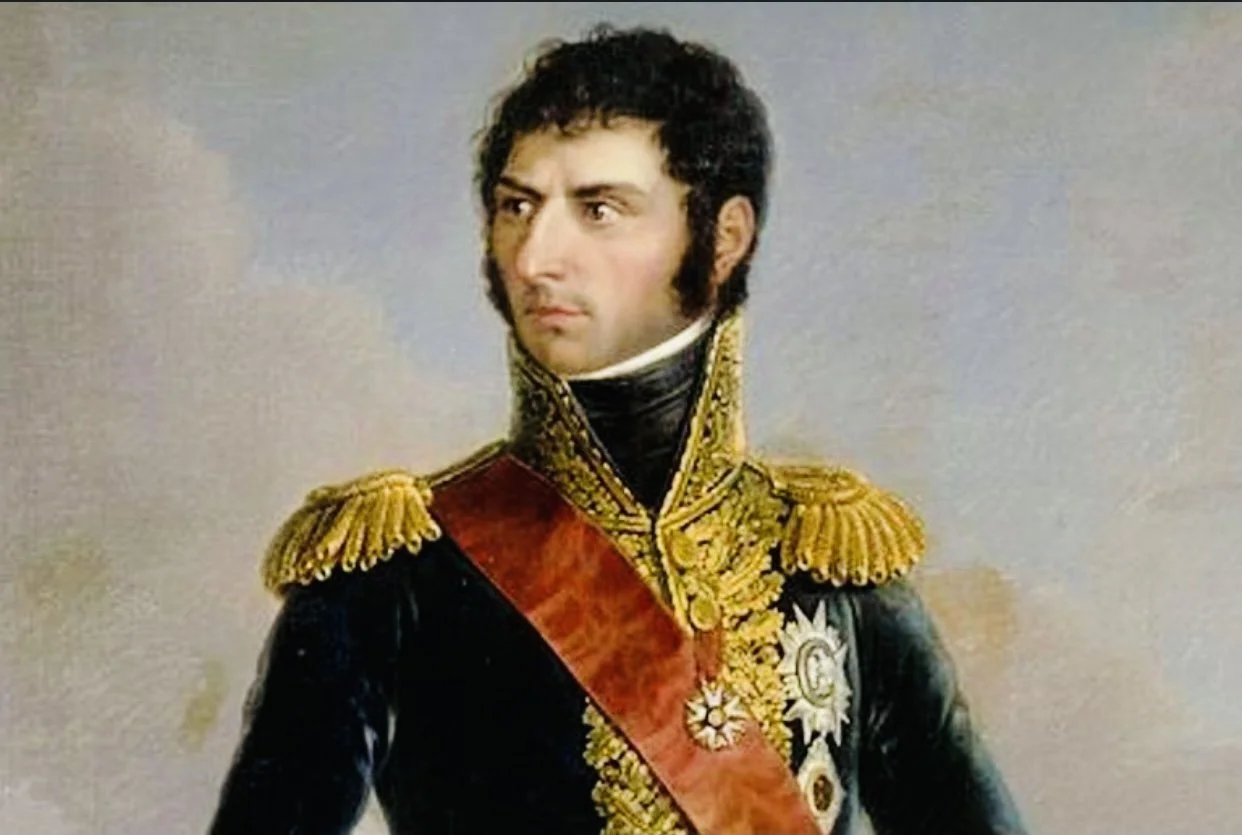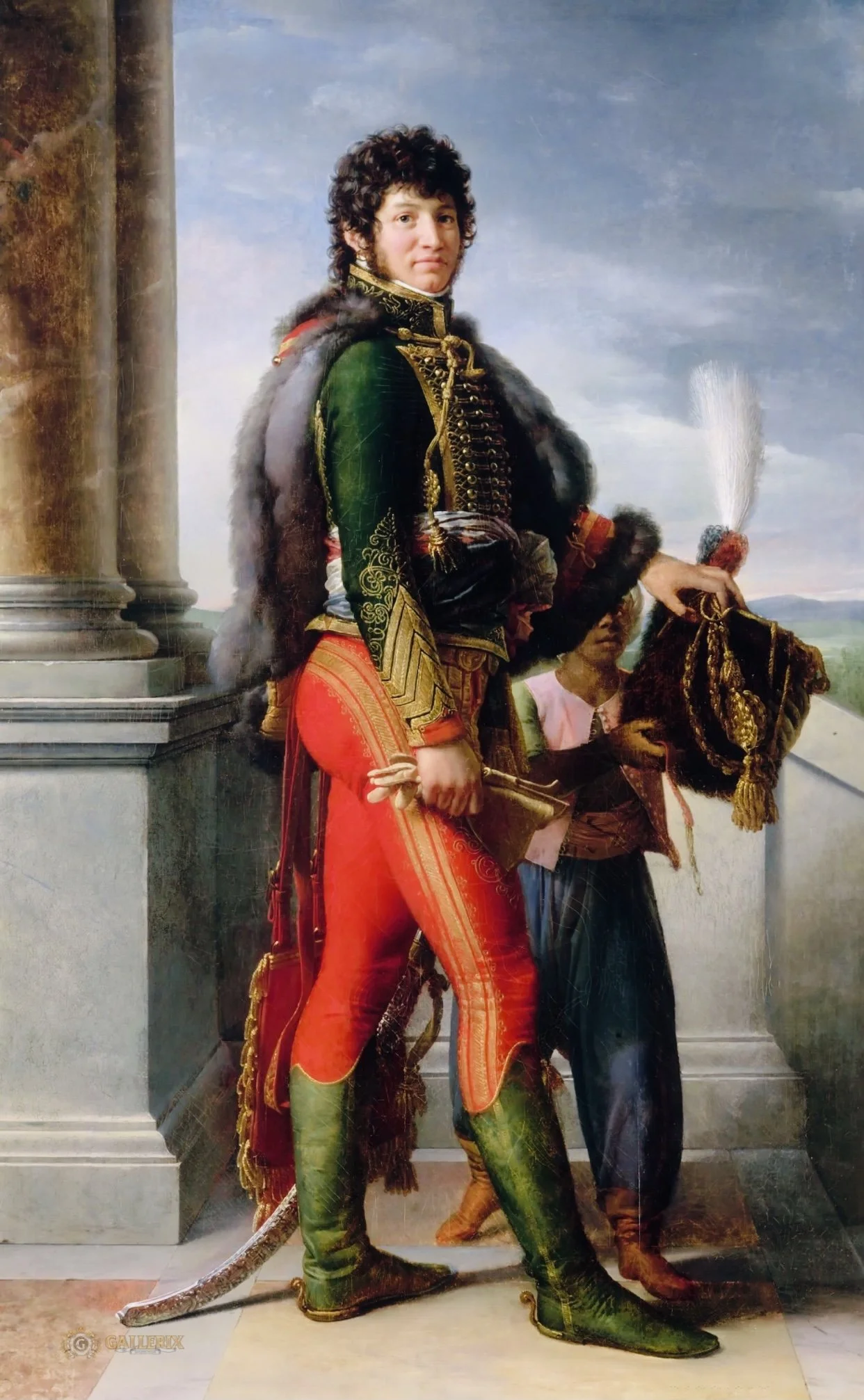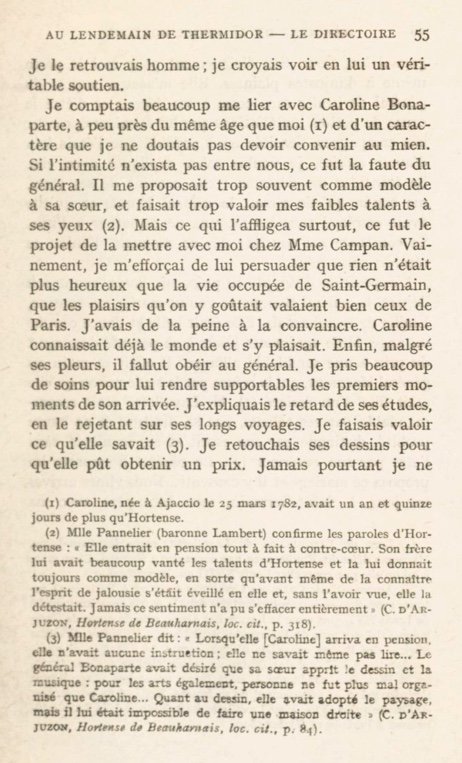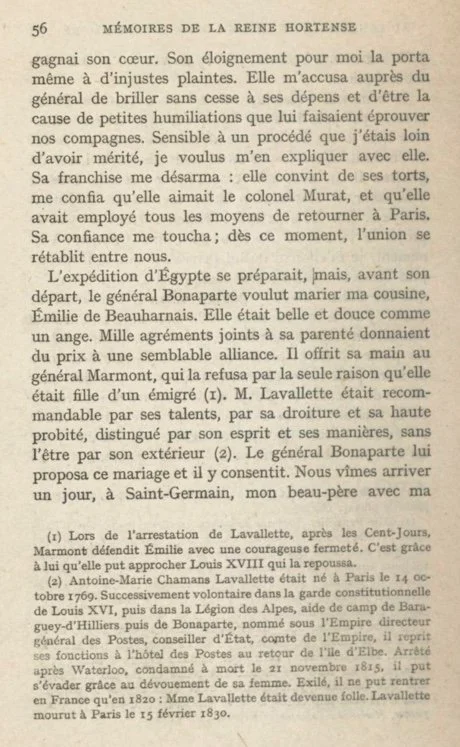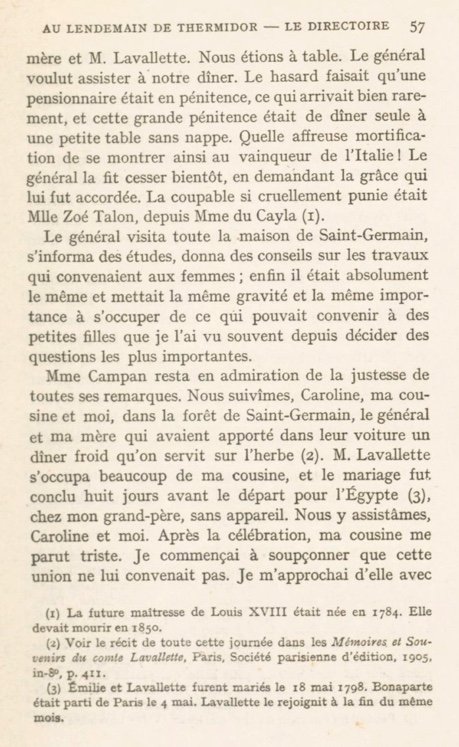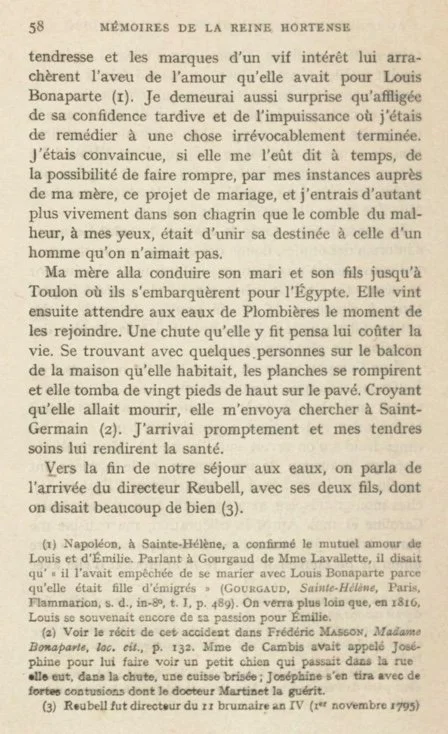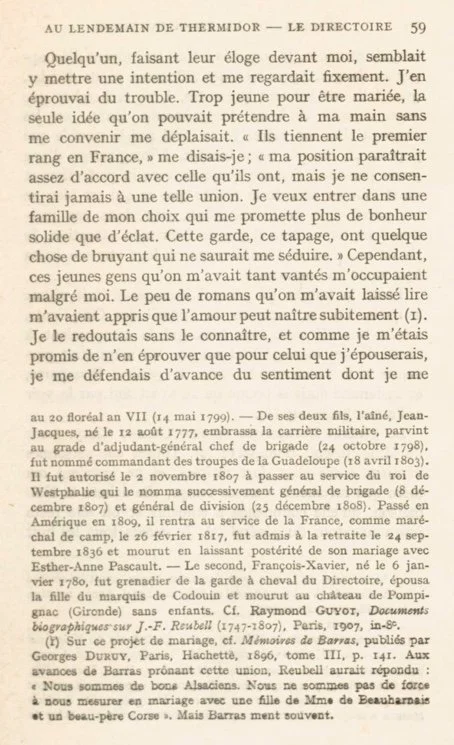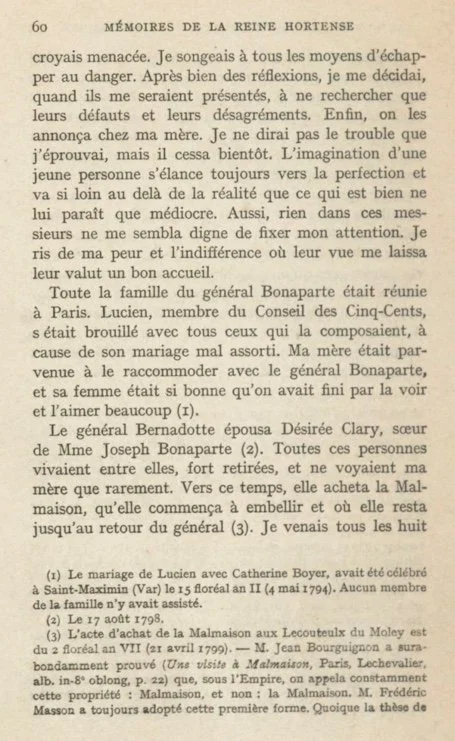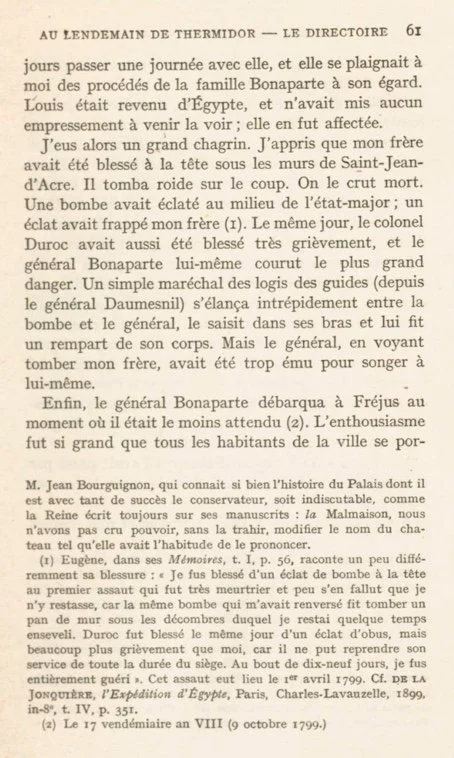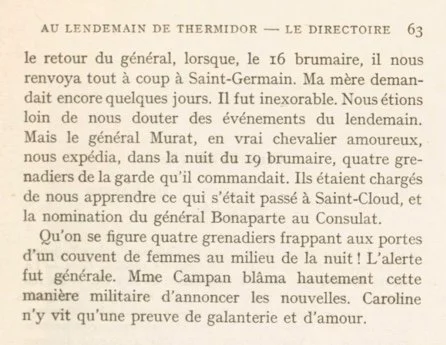Let’s have another look at Hortense’s Memoirs. If you want to read the book it is available for free at the side bar in English and French. Use the widget on the sidebar to translate the text below into pretty much any language.
In this excerpt, Hortense meets Caroline Bonaparte. She also finds out that her cousin Emilie has married a man she doesn’t love, Lavallette.
Joseph Bonaparte now arrived in Paris with Julie, his wife, his sister Caroline Bonaparte, and his wife's sister Desirée Clary. My brother, whose special mission was completed, accompanied them.
He had been a mere lad when he left and he came back a man. I looked up to him as my natural protector. I had expected to find a real friend in Caroline Bonaparte.
She was about my age, and I had no doubt that our characters would be congenial. It was the General's fault if this did not take place. He too frequently held me up to his sister as a model and was too anxious to impress her with such natural gifts as I happened to possess. But what especially upset her was the idea of becoming a pupil at Madame Campan's boarding school.
In vain I pointed out that no existence could be more agreeable than the busy days we spent at Saint Germain, that the pleasures we found there were quite as great as anything Paris had to offer. I was not able to prove my case. Caroline was already used to society and enjoyed it. Yet in spite of her tears she had to obey the General.
I took a great deal of trouble to make her first moments at school as pleasant as possible. I blamed the fact of her being backward in her studies on her having traveled a great deal. I made much of what knowledge she possessed and retouched her drawings so that she might win a prize. But I failed in my efforts to make her like me. Indeed, she went so far as to bring unjust accusations against me.
She told the General I was always showing off at her expense, that it was I who was responsible for the petty humiliations her fellow pupils inflicted on her. Wounded by these undeserved attacks, I demanded that she explain her attitude. She did so with a frankness that disarmed me.
She admitted her injustice, confessed she was in love with Colonel Murat, and vowed she was prepared to employ every means in her power to be taken out of school and brought back to Paris. Touched by her confession I forgave her, and from that moment on we became friends. The expedition to Egypt was in course of preparation but General Bonaparte before his departure wished to arrange the marriage of my cousin Emilie de Beauharnais.
The latter was as beautiful and sweet as an angel. A thousand personal charms in addition to her position made her a most desirable match.
The General offered her hand to General Marmont, who only declined because she was the daughter of an émigré.
Monsieur Lavalette was eligible on account of his ability and his highly honorable character. He was distinguished in mind and manner if not in looks. General Bonaparte suggested this marriage to him and he accepted.
One day he appeared at Saint Germain as escort to the General and my mother. We were at luncheon. As it happened one of the girls was in disgrace, a thing that very rarely occurred. Her punishment consisted in being obliged to sit at a separate table without a table cloth.
Imagine what a terrible mortification it was for the poor girl to be found thus by the conqueror of Italy. The General put an end to the ordeal in a few minutes by asking for and obtaining the culprit's pardon. The victim of this tragic occurrence was Mademoiselle Zoe Talon, later Madame du Cayla (mistress of Louis XVIII).
The General inspected the whole school. He asked about the various courses of study, gave his opinion as to what subjects were the most important for women, in short devoted the same serious care and attention to these matters which concerned only a few little girls as I have since seen him give to problems of great importance. Madame Campan was impressed by the aptness of his remarks.
Emilie and Hortense
Caroline, my cousin and I accompanied the visitors for a drive in the forest of Saint Germain. They had brought a cold meal with them in their carriage, and we dined on the grass. Monsieur Lavalette was very attentive to my cousin, and the marriage took place a week before the departure of the expedition to Egypt.
Caroline was probably the most ambitious of the Bonapartes. She eventually sold out Napoleon in the hopes of keeping the crown of Naples. When that failed, she sold out to the Austrian aristocracy.
It was celebrated very simply at my grandfather's house. Caroline and I were present. After the ceremony it seemed to me that my cousin looked sad. The idea occurred to me that perhaps the match was not to her liking. I spoke to her with tender solicitude, and she finally admitted that she was in love with Louis Bonaparte.
I was both surprised and grieved at this tardy confession and at my helplessness to modify a step which had been definitely taken. I was convinced that had she spoken earlier, I, acting through mother, could have broken off the engagement.
Her grief touched me all the more keenly since marriage to a man you did not love seemed to me the most terrible fate imaginable. My mother accompanied her husband and my brother as far as Toulon whence they were to sail for Egypt.
From Toulon she went to Plombieres while waiting for the time when she could follow them. A fall came near costing her her life.
She was standing with some other persons on a balcony when the planks gave way and she fell twenty feet to the pavement. Thinking she was about to die she sent for me at Saint Germain. I arrived at once, and my tender care restored her to health.
Toward the close of our stay at Plombieres people spoke enthusiastically of the approaching arrival of Director Reubell and his two sons. Someone praised them in my presence and did so rather pointedly, watching my expression meanwhile. I felt very self-conscious.
Too young to marry I was annoyed at the very idea that a man who might not be to my liking could consider the possibility of becoming my husband. “They hold the highest rank in France," I said to myself, "consequently there is no social difference between us, but I could never consider such a match.
My dream is to enter an old, well established family where I will find solid happiness rather than glittering display.
All this pretentiousness has something cheap about it that displeases me. Yet I could not help thinking about these young men of whom I had heard so many agreeable things. The few novels I had been allowed to read had taught me love may come suddenly.
Without having pictured it in my mind I feared its approach. I had promised myself I would not give my heart to anyone except the man I was destined to marry. I fought in advance against the emotion I thought I might feel stir in me. I tried in all sorts of ways to avoid the threatened danger.
Finally, I decided that when the Reubells were introduced I would only notice their faults. In due time they called on my mother. I cannot describe the turmoil of my emotions, but it did not last.
A girl's imagination pictures perfection. The image she forms in her mind surpasses reality to such an extent that when she meets a man who is merely average, he seems hopelessly commonplace. Consequently, I found nothing especially interesting about these gentlemen. I laughed at my terrors, and they benefited by the indifference they aroused. All of General Bonaparte's family were now in Paris. Lucien, a member of the Council of the Five Hundred, had quarreled with all his relatives on account of his un-suitable marriage. [He married Catherine Boyer, daughter of an innkeeper at Saint-Maximien, May 4, 1794. None of his family attended the wedding.]
My mother succeeded in reconciling him with General Bonaparte, and his wife was so nice that everyone ended by receiving her and liking her.
General Bernadotte married Desirée Clary, the sister of Madame Joseph Bonaparte. All these persons kept by themselves, living very quietly and seeing my mother only occasionally.
Desirée had been engaged to Napoleon and Napoleon married Josephine instead and Napoleon always felt kind of guilty about it. This had a huge impact on European history.
Bernadotte, who eventually sold out his own nation of France and was rewarded for doing this as King of Sweden.
About this time, she purchased the estate known as Malmaison, which she improved and where she stayed while waiting for the General's return.
I spent one day each week with her, and she complained to me about the attitude of the Bonaparte family. Louis, for instance, when he came back from Egypt had been in no hurry to go and see her, and this upset her.
I experienced a serious shock about this time when I received word that my brother had been wounded during the attack on Saint Jean d'Acre. A shell had exploded in the midst of the General's staff, a fragment striking Eugene in the head and rendering him unconscious. It was thought at first he had been killed.
The same day Colonel Duroc was seriously wounded, and General Bonaparte himself was in great danger. He had been saved by a sergeant (later General Daumesnil) in the quartermaster corps of a regiment of the Guides. This man threw himself between a shell and the General, seized the latter and covered him with his own body.
The General, overcome at the sight of my brother's wound, had not been aware of the risk he was exposing himself to. At last General Bonaparte disembarked at Frejus at the moment when he was least expected [October 9, 1799].
So great was the enthusiasm that the entire population hastened toward the vessel which brought him to port, climbed aboard and broke all the rules of quarantine.
France at that moment was so wretched that all arms stretched out to the General appealing for aid. All put their hopes in him. I left Paris with my mother to meet the returning soldier.
We went through Burgundy. In every city, every village, triumphal arches had been erected. When we stopped to change horses, the people would gather around our coach to ask whether it was really true that their savior, for that was the name by which all France called the General, had returned.
With Italy lost, the finances exhausted, the Directorate helpless and regarded with contempt, this arrival of the General was considered a Heaven sent miracle.
His progress was marked by continuous ovations. It showed him, and at the same time proved to his enemies, what great things France expected of him.
Hardly had the General reached Paris when all political parties sought him out. All were eager to change the form of government and wished to have his precious help in doing so. It was at Chalon sur Saone that mother and I heard he had traveled up by another route, through the Bourbonnais. He was already in Paris when we arrived there.
Following the General's return Caroline and I stayed in Paris till the 16th Brumaire. On that date he suddenly sent us back to Saint Germain. My mother begged that we stay a few more days with her, but he refused.
Little did we guess what was to happen on the morrow. But on the night of the 19th Brumaire General Murat, in true soldier-lover fashion, sent us four grenadiers of the Guard, of which he was the commander, to tell us the news.
Joachim Murat
It was from them we learned what had taken place at Saint Cloud, and that General Bonaparte had been nominated Consul. Imagine the effect of four grenadiers knocking on the doors of a convent in the middle of the night. Everyone was terrified. Madame Campan disapproved of such a cavalier method of conduct, but Caroline considered it a sign of affection.
The original French is available below:
Contempt for the laws, and the disturbance of public order, are the results of weakness and wavering in princes.


